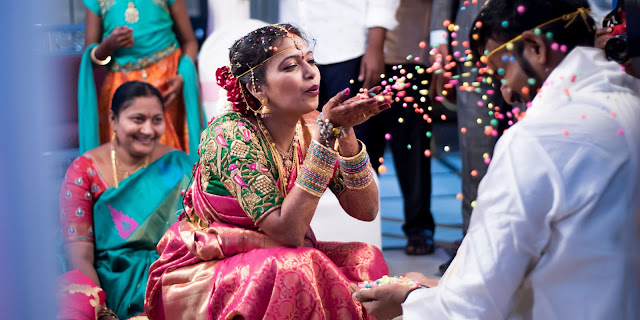Pre-Wedding Ceremonies and Rituals: Significance and Celebration"
Introduction:
India, with its rich cultural diversity, have lots of
exciting and colourful wedding traditions. Pre-wedding ceremonies and rituals
play a vital role in Indian weddings, serving as joyful celebrations that bring
together families, friends, and communities. These rituals are not only a way
to prepare for the grand wedding but also hold deep symbolic meaning. Let's explore
the fascinating world of Indian pre-wedding ceremonies and explore their
significance and celebration.
Roka Ceremony:
The Roka ceremony marks the official announcement and
acceptance of the couple's engagement. It is an intimate gathering where the
families of the bride and groom exchange gifts, blessings, and good wishes. The
ceremony signifies the formal commitment between the two families and
symbolizes the union of two souls, preparing them for the journey of marriage.
Mehndi Ceremony:
The Mehndi ceremony is a joyful occasion filled with music,
dance, and intricate henna designs. The bride and other women in the family
have their hands and feet adorned with beautiful patterns. Besides being a
symbol of auspiciousness, the intricate designs are believed to bring love,
luck, and prosperity to the couple's married life. The celebration includes
singing traditional songs and dances, fostering a sense of unity and excitement
among family members.
Sangeet Ceremony:
The Sangeet ceremony is a night of revelry and
entertainment. It showcases the cultural heritage of India through dance and
music performances by family members and close friends. The bride's and groom's
families engage in friendly competitions, adding a playful spirit to the
festivities. The Sangeet ceremony serves as a means of bonding between the two
families, and its celebratory nature helps alleviate any pre-wedding jitters.
Haldi Ceremony:
The Haldi ceremony is a traditional ritual where a paste of
turmeric, sandalwood, and other ingredients is applied to the bride and groom's
bodies. It is believed to purify and cleanse their skin and bring a natural
glow. The yellow colour of turmeric symbolizes auspiciousness, fertility, and
protection from evil spirits. The ceremony is accompanied by joyful singing and
laughter, creating an atmosphere of happiness and anticipation.
Ganesh Puja:
Before the wedding day, a Ganesh Puja is performed to seek
the blessings of Lord Ganesha, the remover of obstacles. The ceremony takes
place at the bride's and groom's homes, where a priest conducts rituals and
prayers. Seeking Ganesha's blessings is believed to ensure a smooth and
successful wedding, as well as a blissful married life. Family members gather
to participate in the puja, reinforcing the sense of togetherness and
spirituality.
Conclusion:
Indian pre-wedding ceremonies and rituals bring forth the
essence of joy, love, and unity. These events not only prepare the couple for
their new journey but also serve as opportunities for families and friends to
come together, celebrate, and create lasting memories. Each ceremony holds deep
symbolic meaning, reinforcing cultural traditions and fostering a sense of
belonging. Through these rituals, India showcases its diverse cultural
heritage, making Indian weddings an extraordinary and cherished affair.
So, whether it's the vibrant Mehndi, the energetic Sangeet,
or the serene Ganesh Puja, Indian pre-wedding ceremonies encapsulate the spirit
of celebration, love, and togetherness, creating an unforgettable experience
for all involved.



Comments
Post a Comment